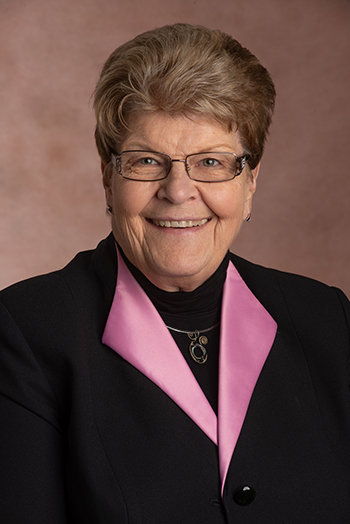
During a career that has spanned more than 40 years, Jan Werbinski, MD, has become a renowned educator and supporter of sex and gender based medicine, advocating for a revolution in the delivery of healthcare to women that takes into consideration the ways in which women, their health, and their care needs differ from men’s.
“It really boils down to how physiology, evaluation, and treatment of disease is different in women than it is in men,” Dr. Werbinski said recently.
For Dr. Werbinski, a clinical associate professor emerita in the medical school’s Department of Obstetrics and Gynecology, her work around sex and gender based medicine is her passion and it has led her – for many years now – to push for changes in the way current and future physicians learn about sex- and gender-appropriate medicine.
Through it all, she has become a national voice on the issue, whether it be through her work with the American Medical Women’s Association (AMWA) or her role as Executive Director of AMWA’s Sex and Gender Health Collaborative. Recently, even, she was featured in a piece on the Today show.
Dr. Werbinski said she has been a member of AMWA for the length of her career and, since 2009, she led efforts at AMWA to advocate for the establishment of a medical specialty in women’s health. She wrote the position paper for AMWA advocating for the organization’s support of sex and gender based medicine and she has co-authored four other research papers on the topic.
Dr. Werbinski’s work with AMWA continues and, in December, she was elected president-elect of AMWA for 2020. She will serve as AMWA president in 2021 and immediate past president in 2022.
At WMed, Dr. Werbinski is secretary of the medical school’s newly established AMWA branch, AMWA@WMed, and serves as an advisor and mentor within the student AMWA group. Additionally, she teaches courses on sex and gender based medicine for first-second-, and third-year students in the Professions of Medicine (POM) course.
“We know now that there are differences in the sexes in every disease and every cell and every organ system,” Dr. Werbinski said. “What I urge the students to do is ask one question in every medical venue they attend – how would a particular condition or disease look in the opposite sex?
Dr. Werbinski said her work has made WMed one of 60 medical schools in the U.S. that are currently teaching medical students about sex and gender based medicine.
“I’m really excited to be teaching it because it is so important for our future doctors,” she said. “It has started a movement of people who will think about how a disease or condition could be different in women.”
During the POM 6 course, Dr. Werbinski said she presents students with examples and case presentations that illustrate how women may have been ignored or harmed because their treatment did not take into account the differences which research has uncovered. For example, she said, WMed students know now that jaw pain and fatigue can be a sign of a heart attack for women.
Her work with students is making a difference, Dr. Werbinski said. After the conclusion of a recent POM 6 course at WMed, she received an e-mail from a student informing her that the knowledge they gained from the course – specifically the specialized treatment of urinary tract infections in older women – led to the student discussing with an attending physician the need to give a patient antibiotics for a longer period of time than originally planned.
“I know it is making an impact individually,” Dr. Werbinski said. “But as a system, I don’t think it’s been embraced fully yet.” Dr. Werbinski is proposing that schools raise funding to establish Endowed Chairs in Sex and Gender Medicine, to insure that these concepts become embedded into the standard curriculum.
With that in mind, Dr. Werbinski’s work is continuing. Nationally, the Sex and Gender Health Collaborative has worked with the National Board of Medical Examiners (NBME) to identify gaps in test questions that may not take into account sex and gender differences. They have presented workshops at the AMA’s Change Med Ed Conference, and are writing an article for the American Association of Medical Colleges newsletter.
“It’s a long process: from introducing sex and gender based concepts to bringing attention to them on a national level to help people understand its importance,” Dr. Werbinski said. “It’s been a long trip.”
